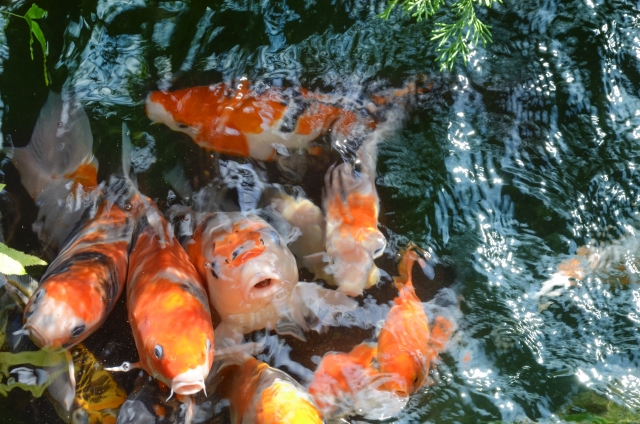It is suffocatingly hot day after day, yet we made a summer journey to Tsuwano, Shimane. The path to Yamaguchi and Shimane is like a fairy tale. Roofs of houses are peculiar in the area, green is thick and luxuriant, and people are calm and quiet. Tsuwano is often described as Little Kyoto, but I think the word Kyoto is needless. Breeze is refreshing, light of the sun is sparkling, and water runs through bountifully.
身を焦がすほどに熱い毎日だけれど、今度は津和野へ夏旅に出掛けて来た。山口島根へ続く田舎道は、御伽の国へ続く路のようだと、車で走り抜ける度にいつも思う。摂州瓦を葺いた家々と、あふれ滴る緑と、静かな暮らしがある。津和野は小京都と呼び称されることも多いけれど、京都という言葉がいらないほどに美しく小さな町だ。風が爽やかに香り、陽光の粒が煌めき、水が豊かに流れている。



I visited Tsuwano numbers of times, and this time we wanted to see Heron Dance recognized as UNESCO cultural heritage. Heron Dance is traditional art of Refined Dance of Japan, with ancient instruments and costumes which has hundreds of years of history. Heron Dance is originated in Kyoto, and it was settled in 1542 in Tsuwano to commemorate rich harvests and prevention of maladies.
津和野は度々来ているのだが、今回は世界遺産の風流踊りにも認定されている鷺舞(さぎまい)を目当てに訪れた。風流踊りとは、衣装や持ち物にも趣向を凝らし、伝統的な和楽器などの囃子に合わせて舞う、何百年もの歴史を持つ日本の民俗芸能だ。この鷺舞は京都に始まり、1542年より津和野で神事として五穀豊穣、厄災防除のために舞われることになったそうだ。


Children dancing little heron lovelily. And grownups follows. Local performers marching in one after another.
子供たちが愛らしくも懸命に舞う小鷺舞。それに続く大人たちの鷺舞。演者の方々が次々と出て来られた。






It is evident that people of Tsuwano have protected and preserved this traditional art for over 500 years with unyielding spirit becoming one. Under the scorching heat of over 35°C, the audience were mesmerized in the dance and taking pictures and movies with sweat like a fall rolling down.
五百年にも渡る遥かな年月に渡り、津和野の人々の誰もが一丸になって守り続けて来た伝統芸能だという誇りが、ひしひしとその所作から伝わってくる。35度を上回る灼熱の空の下、聴衆は皆滝のような大汗を滴らせながら舞に見入り、写真や動画を撮っていた。



All the performers put on layered costumes, and it must’ve been so stifling almost torturous. There was severe reality to preserve traditional art to pass down to next generations. And it was impossible to conclude something amazingly beautiful. However, in spite of the excruciating situation, they showed us gem of beauty, one of a kind choreography. Here, I want to represent my gratitude.
演者の方々は幾重にも分厚い衣装を着込んでおり、さぞ難儀であった筈で、それでもあの演目を滞りなく行うのは、むしろ苦役に近かったと推察する。伝統芸能を守り、それを後世に伝えてゆくということの、綺麗事では済まされない苛烈さがそこにはあった。そんな中にあっても、珍かな価値高い鷺舞を見せて頂けたこと、本当にありがとうございました。
After the show, we strolled down the main street. Tsuwano is called upon Little Kyoto, and the classy atmosphere is similar to it. Dropped in shop by shop, saying “Konnichiwa!” and browsing around is so much fun. There were some foreign tourists and students from abroad.
鷺舞を見た後は町を散策。津和野は小京都というだけあって、やはり京都を思わせる古式床しい店並みがある。一軒一軒に「こんにちは。」と入って行き、いろんなものを眺めてゆくのは本当に愉しい。外国からの観光客や留学生と思しき人たちも、ちらほら散見された。





For lunch, we savored Tsuwano famous Inari zushi, soba, and edible wild plants. It’s a treat only who made a journey all the way can appreciate. Traveling countryside of Japan is the best way to immerse in the beauty, where genuine elements are kept and embraced as they are.
お昼ご飯には、津和野名物の稲荷寿司とかやく蕎麦と山菜とお漬物を頂いた。これは遠路足を運んだ者だけが与れる美味である。日本は田舎にこそ、本当に美しいものが美しいままに残されていると、やっぱり今回も再確認した夏旅だった。

Love and Peace.






















